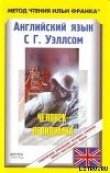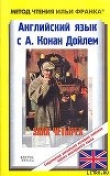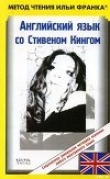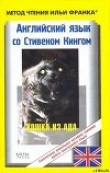
Текст книги "Английский язык с Шерлоком Холмсом. Собака Баскервилей (ASCII-IPA)"
Автор книги: Артур Конан Дойл
Соавторы: Илья Франк,Сергей Андреевский
Жанры:
Языкознание
,сообщить о нарушении
Текущая страница: 14 (всего у книги 38 страниц) [доступный отрывок для чтения: 14 страниц]
"I feel that also, sir, and so does my wife. But to tell the truth, sir, we were both very much attached to Sir Charles, and his death gave us a shock and made these surroundings very painful to us. I fear that we shall never again be easy in our minds at Baskerville Hall."
"But what do you intend to do?"
"I have no doubt, sir, that we shall succeed in establishing ourselves in some business. Sir Charles's generosity has given us the means to do so. And now, sir, perhaps I had best show you to your rooms."
A square balustraded gallery ran round the top of the old hall (широкая галерея, огражденная перилами, проходила по всему верху старинного холла; square – квадратный; широкий; balustrade – парапет, перила; to run – бежать; тянуться; round – вокруг; на всем протяжении), approached by a double stair (на нее вела лестница, /состоящая/ из двух пролетов; double – двойной, состоящий из двух частей). From this central point two long corridors extended the whole length of the building (от этой центральной точки = от этого места по всей длине здания тянулись два длинных коридора), from which all the bedrooms opened (куда выходили все спальни; to open – открывать; начинаться). My own was in the same wing as Baskerville's (моя собственная была в том же крыле здания, что и Баскервиля) and almost next door to it (и почти по соседству; next door – рядом, по соседству). These rooms appeared to be much more modern (эти комнаты оказались намного более современными) than the central part of the house (чем центральная часть здания), and the bright paper and numerous candles did something to remove the sombre impression (а светлые обои и множество свечей помогли немного избавиться от гнетущего впечатления; to do – делать; оказывать /услугу/; to remove – удалить, снять) which our arrival had left upon my mind (которое наш приезд у меня оставил = которое у меня создалось после приезда сюда; mind – разум; настроение).
approach[@'pr@utS], almost ['O:lm@ust], numerous ['nju:m(@)r@s]
A square balustraded gallery ran round the top of the old hall, approached by a double stair. From this central point two long corridors extended the whole length of the building, from which all the bedrooms opened. My own was in the same wing as Baskerville's and almost next door to it. These rooms appeared to be much more modern than the central part of the house, and the bright paper and numerous candles did something to remove the sombre impression which our arrival had left upon my mind.
But the dining-room which opened out of the hall (но обеденный зал, которым оканчивался холл) was a place of shadow and gloom (был темным и мрачным местом; shadow – тень; полумрак). It was a long chamber with a step separating the dais where the family sat (это была длинная комната со ступенькой, отделяющей помост/возвышение, где сидели хозяева) from the lower portion reserved for their dependents (от более низкой части, предназначенной для их вассалов; dependent – зависимый, подвластный). At one end a minstrels' gallery overlooked it (в одном конце возвышались хоры для менестрелей; gallery – галерея; хоры; to overlook – обозревать; возвышаться /над местностью/). Black beams shot across above our heads (черные балки перекрещивались над нашими головами; to shoot – стрелять; тянуться, простираться; across – поперек; крест-накрест), with a smoke-darkened ceiling beyond them (а за ними /виднелся/ потемневший от дыма потолок). With rows of flaring torches to light it up (ряды горящих факелов, освещавшие это /помещение/), and the colour and rude hilarity of an old-time banquet (колорит и грубое веселье пиршеств давних времен), it might have softened (возможно /тогда/ смягчали /впечатление/); but now, when two black-clothed gentlemen sat in the little circle of light (но сейчас, когда двое одетых в черное джентльмена сидели в маленьком круге света) thrown by a shaded lamp (отбрасываемого лампой с абажуром), one's voice became hushed and one's spirit subdued (голос каждого стал тихим, а настроение подавленным).
shadow ['S&d@u], portion ['pO:S(@)n], banquet ['b&NkwIt]
But the dining-room which opened out of the hall was a place of shadow and gloom. It was a long chamber with a step separating the dais where the family sat from the lower portion reserved for their dependents. At one end a minstrels' gallery overlooked it. Black beams shot across above our heads, with a smoke-darkened ceiling beyond them. With rows of flaring torches to light it up, and the colour and rude hilarity of an old-time banquet, it might have softened; but now, when two black-clothed gentlemen sat in the little circle of light thrown by a shaded lamp, one's voice became hushed and one's spirit subdued.
A dim line of ancestors, in every variety of dress (полутемная череда предков в самых различных одеждах; every – каждый; всевозможный), from the Elizabethan knight to the buck of the Regency (от кавалера елизаветинских /времен/ до франта /времен/ Регентства; knight – рыцарь; кавалер; buck – самец животного; щеголь /уст./), stared down upon us and daunted us by their silent company (со /стен/ наблюдали за нами, удручая своим молчаливым обществом; to daunt – обуздывать; приводить в уныние, удручать). We talked little (мы говорили мало), and I for one was glad when the meal was over (и что до меня, то я был очень рад, когда ужин закончился; for one – например; что касается; meal – еда; прием пищи) and we were able to retire into the modern billiard-room and smoke a cigarette (и мы смогли перейти в современную бильярдную и выкурить папиросу).
"My word, it isn't a very cheerful place (да уж, не очень-то веселое место; my word – даю слово, клянусь честью; видит Бог)," said Sir Henry. "I suppose one can tone down to it (полагаю, ко всему этому можно привыкнуть; to tone – придавать желательный тон; гармонировать), but I feel a bit out of the picture at present (но в данный момент я чувствую себя немного лишним здесь; to be out of the picture – не соответствать ситуации; быть не у дел, ср.: I seem to be out of the picture. What's going on here? – Я уже отстал от жизни. Что здесь творится?). I don't wonder that my uncle got a little jumpy (не удивительно, что у дяди пошаливали нервы; jumpy – нервный, неспокойный; to jump – прыгать, скакать; вскакивать, подпрыгивать, подскакивать /от возбуждения, нервного шока/; вздрагивать) if he lived all alone in such a house as this (если он жил совершенно один в таком доме, как этот). However, if it suits you (так вот, если вас это устроит = если вы не против), we will retire early to-night (/давайте/ сегодня ляжем спать пораньше; to retire for the night – ложиться спать), and perhaps things may seem more cheerful in the morning (и, может быть, утром все покажется более жизнерадостным)."
ancestor ['&nsIst@], cheerful ['tSI@f(@)l], suit [sju:t]
A dim line of ancestors, in every variety of dress, from the Elizabethan knight to the buck of the Regency, stared down upon us and daunted us by their silent company. We talked little, and I for one was glad when the meal was over and we were able to retire into the modern billiard-room and smoke a cigarette.
"My word, it isn't a very cheerful place," said Sir Henry. "I suppose one can tone down to it, but I feel a bit out of the picture at present. I don't wonder that my uncle got a little jumpy if he lived all alone in such a house as this. However, if it suits you, we will retire early to-night, and perhaps things may seem more cheerful in the morning."
I drew aside my curtains before I went to bed (прежде чем лечь в постель, я раздвинул шторы; to draw – тащить, тянуть; aside – в сторону; to go to bed – ложиться спать) and looked out from my window (и выглянул из окна). It opened upon the grassy space (оно выходило на газон; grassy – травянистый; покрытый травой; space – пространство; территория) which lay in front of the hall door (находящийся перед парадной дверью). Beyond, two copses of trees moaned and swung in a rising wind (позади /него/ две рощицы молодых деревьев стонали и раскачивались под порывами ветра; copse – рощица/поросль; to swing; rising wind – усиливающийся ветер). A half moon broke through the rifts of racing clouds (серп луны выглядывал сквозь просветы несущихся /по небу/ облаков; to break through – прорваться, пробиться). In its cold light I saw beyond the trees a broken fringe of rocks (в его холодном свете за деревьями я увидел неровный край скал; broken – сломанный; неровный, извилистый) and the long, low curve of the melancholy moor (и длинную, /лежащую/ внизу, линию мрачных болот; low – низкий уровень, низина; curve – кривая линия). I closed the curtain (я задернул штору), feeling that my last impression was in keeping with the rest (чувствуя, что последнее мое впечатление не отличается от остальных = от первого; to be in keeping with smth. – согласовываться, гармонировать с чем-либо).
And yet it was not quite the last (но, однако, оно оказалось не последним; quite – вполне; до некоторой степени). I found myself weary and yet wakeful (я чувствовал себя уставшим и все же не склонным ко сну = но, несмотря на это, заснуть не мог; wakeful – бодрствующий, неспящий), tossing restlessly from side to side (беспокойно ворочаясь с боку на бок; to toss – кидать; беспокойно метаться), seeking for the sleep which would not come (призывая сон, который все не приходил; to seek for – искать).
curtain [k@:tn], door ['dO:], weary ['wI@rI]
I drew aside my curtains before I went to bed and looked out from my window. It opened upon the grassy space which lay in front of the hall door. Beyond, two copses of trees moaned and swung in a rising wind. A half moon broke through the rifts of racing clouds. In its cold light I saw beyond the trees a broken fringe of rocks and the long, low curve of the melancholy moor. I closed the curtain, feeling that my last impression was in keeping with the rest.
And yet it was not quite the last. I found myself weary and yet wakeful, tossing restlessly from side to side, seeking for the sleep which would not come.
Far away a chiming clock struck out the quarters of the hours (вдалеке часы отбивали /каждые/ четверть часа; to chime – звонить в колокол; бить /о часах/; to strike – бить, ударять), but otherwise a deathly silence lay upon the old house (и затем снова мертвая тишина овладевала старым домом: «но в остальном мертвая тишина лежала над старым домом»; otherwise – иначе; во всем остальном). And then suddenly, in the very dead of the night (затем вдруг, в самую глухую пору ночи; dead – мертвец; глухая пора), there came a sound to my ears (до моих ушей донесся звук), clear, resonant, and unmistakable (чистый, звучный и не оставляющий сомнения /в своем происхождении/; unmistakable – безошибочный, несомненный, очевидный, ясный). It was the sob of a woman (это были рыдания женщины), the muffled, strangling gasp of one (приглушенные, сдавленные рыдания человека; gasp – затрудненное дыхание; удушье) who is torn by an uncontrollable sorrow (которого мучило неудержимое горе; to tear – рвать; причинять страдания). I sat up in bed and listened intently (я сел в кровати и прислушался; intently – пристально, внимательно, сосредоточенно). The noise could not have been far away (шум = плач не мог /доноситься/ издалека), and was certainly in the house (и определенно шел из дома). For half an hour I waited with every nerve on the alert (в течение получаса я напряженно ждал; nerve – нерв; alert – настороженный), but there came no other sound save the chiming clock (но не доносилось ни звука, кроме боя часов) and the rustle of the ivy on the wall (и шороха плюща на стене).
silence ['saIl@ns], suddenly ['sVdnlI], half [hA:f]
Far away a chiming clock struck out the quarters of the hours, but otherwise a deathly silence lay upon the old house. And then suddenly, in the very dead of the night, there came a sound to my ears, clear, resonant, and unmistakable. It was the sob of a woman, the muffled, strangling gasp of one who is torn by an uncontrollable sorrow. I sat up in bed and listened intently. The noise could not have been far away, and was certainly in the house. For half an hour I waited with every nerve on the alert, but there came no other sound save the chiming clock and the rustle of the ivy on the wall.
CHAPTER VII. THE STAPLETONS OF MERRIPIT HOUSE
(Стэплтоны из Меррипит-хаус)
THE fresh beauty of the following morning did something to efface from our minds the grim and grey impression (свежая прелесть следующего утра несколько удалила из нашей памяти зловещий и мрачный осадок: «впечатление»; mind – разум; память) which had been left upon both of us (оставленный у нас обоих) by our first experience of Baskerville Hall (нашим первым знакомством с Баскервиль-холлом; experience – опыт; впечатление). As Sir Henry and I sat at breakfast (когда мы с сэром Генри сели завтракать) the sunlight flooded in through the high mullioned windows (солнечный свет лился через высокие створчатые окна), throwing watery patches of colour from the coats of arms (бросая бледные цветные пятна сквозь гербы) which covered them (которые их покрывали). The dark panelling glowed like bronze in the golden rays (темная обшивка сверкала бронзой в золотых лучах), and it was hard to realize that this was indeed the chamber (и трудно было поверить, что это та самая комната; to realize – осуществлять; представлять себе) which had struck such a gloom into our souls upon the evening before (которая предыдущим вечером вселяла уныние в наши души; to strike – ударять; вселять /страх и т. п./; gloom – мрак; уныние).
"I guess it is ourselves and not the house that we have to blame (полагаю, что это мы себя, а не дом, должны винить в этом)!" said the baronet (сказал баронет). "We were tired with our journey (мы устали после нашего путешествия) and chilled by our drive (и продрогли по дороге /сюда/), so we took a grey view of the place (поэтому нам показалось мрачным это место; to take a view – придерживаться /каких-либо/ взглядов). Now we are fresh and well (а теперь мы свежи и полны сил; well – здоровый), so it is all cheerful once more (поэтому и все вокруг снова прекрасно)."
beauty ['bju:tI], mullion ['mVlI@n], experience [Iks'pI@rI@ns]
THE fresh beauty of the following morning did something to efface from our minds the grim and grey impression which had been left upon both of us by our first experience of Baskerville Hall. As Sir Henry and I sat at breakfast the sunlight flooded in through the high mullioned windows, throwing watery patches of colour from the coats of arms which covered them. The dark panelling glowed like bronze in the golden rays, and it was hard to realize that this was indeed the chamber which had struck such a gloom into our souls upon the evening before.
"I guess it is ourselves and not the house that we have to blame!" said the baronet. "We were tired with our journey and chilled by our drive, so we took a grey view of the place. Now we are fresh and well, so it is all cheerful once more."
"And yet it was not entirely a question of imagination (однако дело было не только в нашем воображении; question – вопрос; дело)," I answered (откликнулся я). "Did you, for example, happen to hear someone (вам, к примеру, не случилось слышать, как кто-то), a woman I think (я полагаю, женщина), sobbing in the night (рыдал ночью)?"
"That is curious (это любопытно), for I did when I was half asleep fancy (поскольку, действительно, когда я /уже/ почти заснул, мне показалось; to fancy – воображать, представлять себе) that I heard something of the sort (что я слышал что-то в этом роде). I waited quite a time, but there was no more of it (я подождал, но это больше не повторилось: «но этого больше не было»), so I concluded that it was all a dream (поэтому я решил, что все это было сном; to conclude – завершить; сделать вывод)."
"I heard it distinctly (я слышал это отчетливо), and I am sure that it was really the sob of a woman (и /совершенно/ уверен, что это был действительно плач женщины)."
"We must ask about this right away (мы должны спросить об этом прямо сейчас)." He rang the bell and asked Barrymore (он позвонил в колокольчик и спросил Бэрримора; to ring) whether he could account for our experience (не мог бы он объяснить это происшествие; to account for – объяснять /что-либо/; experience – опыт; случай, событие). It seemed to me that the pallid features of the butler turned a shade paler still (мне показалось, что бледное лицо дворецкого стало еще бледнее; a shade – немного; shade – тень; still – до сих пор; еще /более/) as he listened to his master's question (когда он слушал вопрос хозяина).
"There are only two women in the house, Sir Henry (в доме всего две женщины, сэр Генри)," he answered (ответил он). "One is the scullery-maid (одна из них посудомойка; scullery – помещение для мытья посуды; maid – девушка; служанка), who sleeps in the other wing (которая спит в другом крыле). The other is my wife (другая – моя жена), and I can answer for it (но я могу вас уверить в том; to answer for – ручаться) that the sound could not have come from her (что она не плакала: «этот звук шел не от нее»)."
hear [hI@], conclude[k@n'klu:d], other ['VD@]
«And yet it was not entirely a question of imagination,» I answered. «Did you, for example, happen to hear someone, a woman I think, sobbing in the night?»
"That is curious, for I did when I was half asleep fancy that I heard something of the sort. I waited quite a time, but there was no more of it, so I concluded that it was all a dream."
"I heard it distinctly, and I am sure that it was really the sob of a woman."
"We must ask about this right away." He rang the bell and asked Barrymore whether he could account for our experience. It seemed to me that the pallid features of the butler turned a shade paler still as he listened to his master's question.
"There are only two women in the house, Sir Henry," he answered. "One is the scullery-maid, who sleeps in the other wing. The other is my wife, and I can answer for it that the sound could not have come from her."
And yet he lied as he said it (и все же он солгал, сказав это), for it chanced that after breakfast I met Mrs. Barrymore in the long corridor (потому что после завтрака я случайно встретил миссис Бэрримор в длинном коридоре; to chance – происходить; случайно наткнуться на; to meet) with the sun full upon her face (и солнце полностью /освещало/ ее лицо). She was a large, impassive, heavy-featured woman (она была высокой, спокойной, с крупными чертами лица женщиной) with a stern, set expression of mouth (ее губы /были/ плотно сжаты; stern – строгий, суровый; set – назначенный; твердый; mouth – рот). But her tell-tale eyes were red (но ее выдавали покрасневшие глаза; tell-tale – предательский, выдающий) and glanced at me from between swollen lids (и взгляд, /брошенный/ на меня из-под припухших век). It was she, then, who wept in the night (выходит, это она плакала ночью; to weep), and if she did so her husband must know it (и если это так, ее муж должен был знать об этом). Yet he had taken the obvious risk of discovery (однако он пошел на очевидный риск быть раскрытым) in declaring that it was not so (утверждая, что это было не так). Why had he done this (с чего бы ему это делать)? And why did she weep so bitterly (и почему она так горько плакала)? Already round this pale-faced, handsome, black-bearded man (вокруг этого представительного человека с бледным лицом и черной бородой) there was gathering an atmosphere of mystery and of gloom (собиралась = сгущалась мрачная атмосфера таинственности; mystery – тайна; gloom – мрак).
large ['lA:dZ], mouth [mauT], mystery ['mIst(@)rI]
And yet he lied as he said it, for it chanced that after breakfast I met Mrs. Barrymore in the long corridor with the sun full upon her face. She was a large, impassive, heavy-featured woman with a stern, set expression of mouth. But her tell-tale eyes were red and glanced at me from between swollen lids. It was she, then, who wept in the night, and if she did so her husband must know it. Yet he had taken the obvious risk of discovery in declaring that it was not so. Why had he done this? And why did she weep so bitterly? Already round this pale-faced, handsome, black-bearded man there was gathering an atmosphere of mystery and of gloom.
It was he who had been the first to discover the body of Sir Charles (это он первым обнаружил тело сэра Чарльза), and we had only his word for all the circumstances (и только с его слов мы /знали/ все обстоятельства) which led up to the old man's death (которые привели к смерти старика; to lead). Was it possible that it was Barrymore after all (возможно ли, что все же это был Бэрримор; after all – все же) whom we had seen in the cab in Regent Street (кого мы видели в кебе на Риджент-стрит)? The beard might well have been the same (борода вполне могла оказаться той же самой). The cabman had described a somewhat shorter man (кебмен описывал человека немного ниже ростом), but such an impression might easily have been erroneous (но такое впечатление легко могло быть ошибочным; to err – заблуждаться, ошибаться; допускать ошибку). How could I settle the point for ever (как же мне разрешить эту загадку /раз и/ навсегда)? Obviously the first thing to do was (очевидно, первое, что нужно было сделать) to see the Grimpen postmaster, and find (это повидать гримпенского почтмейстера и узнать) whether the test telegram had really been placed in Barrymore's own hands (действительно ли /наша/ проверочная телеграмма была доставлена Бэрримору в собственные руки; to place – помещать; отдавать). Be the answer what it might (получи я ответ на этот вопрос: «будь ответ, каким он мог бы быть»), I should at least have something to report to Sherlock Holmes (у меня, по крайней мере, было бы о чем сообщить Шерлоку Холмсу).
circumstance ['s@:k@mst@ns], possible ['pOs@bl], whether ['weD@]
It was he who had been the first to discover the body of Sir Charles, and we had only his word for all the circumstances which led up to the old man's death. Was it possible that it was Barrymore after all whom we had seen in the cab in Regent Street? The beard might well have been the same. The cabman had described a somewhat shorter man, but such an impression might easily have been erroneous. How could I settle the point for ever? Obviously the first thing to do was to see the Grimpen postmaster, and find whether the test telegram had really been placed in Barrymore's own hands. Be the answer what it might, I should at least have something to report to Sherlock Holmes.
Sir Henry had numerous papers to examine after breakfast (после завтрака сэру Генри /нужно было/ изучить множество /деловых/ бумаг), so that the time was propitious for my excursion (так что момент был подходящим для похода на почту: «благоприятным для моей экскурсии»). It was a pleasant walk of four miles along the edge of the moor (это была приятная четырехмильная прогулка вдоль кромки болот), leading me at last to a small grey hamlet (которая привела меня = и я очутился наконец в маленькой скучной деревушке), in which two larger buildings (в которой два строения, которые были больше остальных), which proved to be the inn and the house of Dr. Mortimer (оказавшиеся гостиницей и домом доктора Мортимера), stood high above the rest (возвышались над остальными). The postmaster, who was also the village grocer (почтмейстер, оказавшийся к тому же местным: «деревенским» бакалейщиком), had a clear recollection of the telegram (хорошо помнил /нашу/ телеграмму: «имел ясные воспоминания о телеграмме»).
examine [Ig'z&mIn], walk ['wO:k], hamlet ['h&mlIt]
Sir Henry had numerous papers to examine after breakfast, so that the time was propitious for my excursion. It was a pleasant walk of four miles along the edge of the moor, leading me at last to a small grey hamlet, in which two larger buildings, which proved to be the inn and the house of Dr. Mortimer, stood high above the rest. The postmaster, who was also the village grocer, had a clear recollection of the telegram.
«Certainly, sir,» said he (конечно, сэр, – сказал он), "I had the telegram delivered to Mr. Barrymore (телеграмма была доставлена мистеру Бэрримору; to have smth. + причастие прош. вр. – получить результат какого-либо действия /как следствие собственных усилий или деятельности других лиц/) exactly as directed (в точности, /как и было/ указано)."
"Who delivered it (кто вручил: «доставил» ее)?"
"My boy here (вот, мой сын). James, you delivered that telegram to Mr. Barrymore at the Hall last week, did you not (Джеймс, ты доставил телеграмму мистеру Бэрримору в Баскервиль-холл на прошлой неделе, не так ли)?"
"Yes, father, I delivered it (да, отец, я доставил ее)."
"Into his own hands?" I asked (ему в собственные руки? – спросил я).
"Well, he was up in the loft at the time (ну, в тот момент он был на чердаке), so that I could not put it into his own hands (поэтому я не мог вручить ее ему лично), but I gave it into Mrs. Barrymore's hands (но я отдал ее миссис Бэрримор), and she promised to deliver it at once (и она обещала сразу же передать ее)."
"Did you see Mr. Barrymore (/а/ ты видел мистера Бэрримора)?"
"No, sir; I tell you he was in the loft (нет, сэр, говорю же вам, он был на чердаке)."
"If you didn't see him (если ты его не видел), how do you know he was in the loft (откуда тебе знать, /что/ он был на чердаке)?"
"Well, surely his own wife ought to know where he is (ну, наверняка его собственная жена должна знать, где он находится)," said the postmaster, testily (сказал почтмейстер с раздражением). "Didn't he get the telegram (разве он не получил телеграммы)? If there is any mistake (если произошла какая-то ошибка) it is for Mr. Barrymore himself to complain (пускай мистер Бэрримор сам пожалуется)."
exactly [Ig'z&ktlI], once [wVns], know [n@u]
«Certainly, sir,» said he, «I had the telegram delivered to Mr. Barrymore exactly as directed.»
"Who delivered it?"
"My boy here. James, you delivered that telegram to Mr. Barrymore at the Hall last week, did you not?"
"Yes, father, I delivered it."
"Into his own hands?" I asked.
"Well, he was up in the loft at the time, so that I could not put it into his own hands, but I gave it into Mrs. Barrymore's hands, and she promised to deliver it at once."
"Did you see Mr. Barrymore?"
"No, sir; I tell you he was in the loft."
"If you didn't see him, how do you know he was in the loft?"
"Well, surely his own wife ought to know where he is," said the postmaster, testily. "Didn't he get the telegram? If there is any mistake it is for Mr. Barrymore himself to complain."
It seemed hopeless to pursue the inquiry any farther (казалось бесполезным: «безнадежным» продолжать расспросы дальше), but it was clear that in spite of Holmes's ruse (но было очевидно, что, несмотря на уловку Холмса) we had no proof that Barrymore had not been in London all the time (у нас нет доказательств, что Бэрримор не был в Лондоне все это время). Suppose that it were so (предположим, что это было так) – suppose that the same man had been the last (предположим, что этот самый человек был последним) who had seen Sir Charles alive (кто видел сэра Чарльза живым), and the first to dog the new heir (и первым, кто выследил его наследника) when he returned to England (когда тот приехал: «вернулся» в Англию). What then (что тогда)? Was he the agent of others (был ли он агентом других), or had he some sinister design of his own (или у него есть собственный злой умысел)? What interest could he have in persecuting the Baskerville family (какой может быть у него интерес в преследовании рода Баскервилей)? I thought of the strange warning (я подумал о странном предостережении; to warn – предостерегать) clipped out of the leading article of the Times(вырезанным из передовицы «Таймс»). Was that his work (было это его работой), or was it possibly the doing of someone (или, возможно, это сделал некто) who was bent upon counteracting his schemes (прикладывающий усилия, чтобы помешать его планам; to counteract – препятствовать, противодействовать; to be bent on/upon – устремлять свои помыслы на что-либо; стремиться к чему-либо; bent – склоненный; склонный; to bend – сгибать/ся/, склонять/ся/)?
pursue [p@'sju:], England ['INgl@nd], someone ['sVmwVn]
It seemed hopeless to pursue the inquiry any farther, but it was clear that in spite of Holmes's ruse we had no proof that Barrymore had not been in London all the time. Suppose that it were so – suppose that the same man had been the last who had seen Sir Charles alive, and the first to dog the new heir when he returned to England. What then? Was he the agent of others, or had he some sinister design of his own? What interest could he have in persecuting the Baskerville family? I thought of the strange warning clipped out of the leading article of the Times. Was that his work, or was it possibly the doing of someone who was bent upon counteracting his schemes?
The only conceivable motive was that (единственным вероятным мотивом был тот; conceivable – мыслимый; возможный) which had been suggested by Sir Henry (который предложил сэр Генри), that if the family could be scared away (что если отпугнуть наследников: «семью» /от Баскервиль-холла/) a comfortable and permanent home would be secured for the Barrymores (для Бэрриморов будет обеспечено комфортное и долговременное существование: «жилище»; permanent – постоянный, неизменный; долговременный; перманентный). But surely such an explanation as that would be quite inadequate (но, конечно же, такое объяснение было бы совершенно недостаточным) to account for the deep and subtle scheming (/если/ учитывать те глубокие и коварные интриги; to account for smth. – отчитываться /в чем-либо/; давать отчет /в чем-либо/) which seemed to be weaving an invisible net round the young baronet (которые, казалось, невидимой сетью оплетали молодого баронета; to weave – ткать; плести). Holmes himself had said that no more complex case had come to him (Холмс сам сказал, что ему не попадалось дело более сложное) in all the long series of his sensational investigations (во всей длинной истории его сенсационных расследований; series – ряд; последовательность). I prayed, as I walked back along the grey, lonely road (я молился, когда возвращался назад унылой пустынной дорогой; to walk – идти /пешком/), that my friend might soon be freed from his preoccupations (чтобы мой друг мог скорее освободиться от своих забот) and able to come down to take this heavy burden of responsibility from my shoulders (и приехать /сюда, чтобы/ снять эту тяжелую ношу ответственности с моих плеч; to be able – мочь, быть в состоянии).







